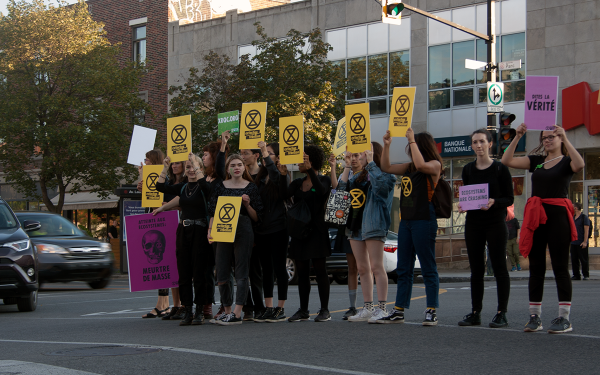Editorial: We’re in This Climate Crisis Together
While Individual Actions Are Nice, Mass Social Movements Are How People Can Truely Tackle Climate Change
What’s often referred to as climate change is arguably the single most pressing issue today. If we don’t have a planet to live on, how could we possibly address any other social issue?
The Guardian’s editorial team decided to pioneer a permanent change in language, switching from calling it climate change, to crisis in their style guide.
“The phrase ‘climate change,’ for example, sounds rather passive and gentle when what scientists are talking about is a catastrophe for humanity,” said their editor-in-chief Katharine Viner in an editorial published in May. The editorial also notes that crisis, rather than change, is more scientifically accurate given the situation’s spiralling gravity.
This is why The Link endorses the Concordia Student Union’s recent campaign on the climate crisis. Their tagline of, “If not now, when?” reflects the urgent nature of this issue.
The CSU’s campaign is multi-faceted; addressing individual, global, and more immediate community-based responsibility. For example, they encourage getting involved in social movements like Fridays for Future or campaigning for Indigenous-led movements.
The campaign notes that, “We’ve done it before and we can do it again,” listing a number of global mass social movements such as the Maple Spring, the South African apartheid, and the push for an eight-hour workday—all sucessful due to the power of mass participation and a real desire for change.
Extinction Rebellion—a climate activist organization with a global reach—is gathering citizens to take action for the Earth. XR’s dedication to the cause with a nonviolent approach speaks loud and clear and sums up their intentions. Montrealers marched with XR over the summer to disrupt with a purpose. Weekly protests in the city will continue over the next two months.
Throughout the last school year, both high school and CEGEP students joined the worldwide movement of weekly one-day strikes to draw attention to the climate crisis. In November, Montrealers made history when about 50,000 people took to the streets to demand better climate policies. Another march is planned for Sept. 27, and this time the Swedish 16-year-old phenom who started the weekly strikes movement Greta Thunberg will join Montrealers in the streets.
A 2017 study showed that 100 companies produce about 70 per cent of our carbon emissions, and so collective action is needed. Making the individual choice to use a reusable bag, bringing your own coffee mug, going zero waste, or cutting animal products from your diet are great initiatives, but they are not enough. We need to dramatically cut down our carbon emissions and move away from fossil fuels as a start.
We know that if the global temperature rises above pre-industrial levels by two degrees Celcius, most of the world’s coral reefs will disappear. More than a quarter of the world’s population will experience extreme heat waves, 411 million people will live through urban droughts, and floods from rising sea levels will affect 80 million people.
With a 1.5 degree increase, the coral reefs, though damaged, won’t disappear. The amount of people exposed to severe heat waves would be about 14 percent while 60 million will be spared from urban drought. And the Earth has already warmed by one degree.
We need better policies and to reinvest in clean, renewable energy and promote better resource efficiencies, as suggested in the American policy demand, the Green New Deal.
It doesn’t seem like those in positions of power are going to radically change their policies any time soon—at least not if we’re quiet.




_600_375_90_s_c1.jpg)


